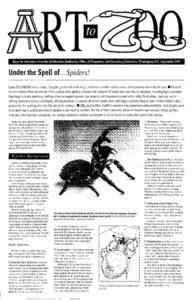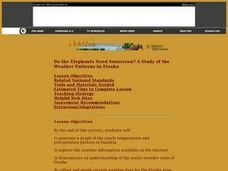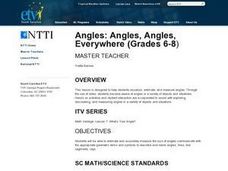Curated OER
Divisibility Rules Using Scientific Calculators
Young learners apply divisibility rules to determine if a number is a factor of another number. They discuss what numbers are factors of another number and identify patterns using divisibility rules.
Curated OER
Solving Equations with Solve It
Pupils solve equations using a TI in this algebra lesson. They will practice solving equations and systems of equations on a TI. The TI-Navigator is required for this assignment.
Curated OER
Under the Spell of Spiders
Young scholars examine spiders. In these spider lessons, students will view spider images and live spiders to determine physical characteristics, habits, and habitats. Young scholars will examine fantasy and folklore about spiders to...
Curated OER
"ART ZOO 'Blacks in the Westward Movement', 'What Can You Do with a Portrait', and 'Of Beetles, Worms, and Leaves of Grass'"
Students study black history, examine portraits and portrait making and create their own portraits, and investigate their natural environment. This humanities lesson provides a text that can be used to teach lessons in black...
Curated OER
Catapults
Students test catapults. In this physics instructional activity, student conduct scientific investigations that require them to test catapults. Students practice their problem solving skills as they employ the use of the scientific method.
Curated OER
A Plop and Fizz
Seventh graders perform an experiment to determine the effect of temperature on reaction rates. In this chemistry lesson, 7th graders take measurements and record data. They create a graph and analyze results.
Curated OER
Differences between Climate and Weather
Students collect weather data over weeks, graph temperature data and compare the temperature data collected with averaged climate data where they live.
Curated OER
Is the Hudson River Too Salty to Drink?
Students explore reasons for varied salinity in bodies of water. In this geographical inquiry lesson plan, students use a variety of visual and written information including maps, data tables, and graphs, to form a hypothesis as to why...
Curated OER
Do the Elephants Need Sunscreen? A Study of the Weather Patterns in Etosha
Students analyze the weather patterns in Namibia. They create a graph of the yearly temperatures and use the internet to gather information. They discuss how the weather goes in cycles in the area.
Curated OER
Getting to the Point
Students determine location by using the technique of triangulation. They imagine that they are out in the wilderness and have come to the top of a ridge. How can one identify the ridge on the topo map? How can one figure out where you...
Curated OER
Heredity Mix 'n Match
Students randomly select jelly beans that represent genes for several human traits such as tongue-rolling ability and eye color. Then, working in pairs (preferably of mixed gender), students randomly choose new pairs of jelly beans from...
Curated OER
TE Activity: Heavy Helicopters
Students study the concepts of weight and drag while making paper helicopters. They measure how adding more weight to the helicopter changes the time for the helicopter to fall to the ground. They apply what they examine to the work of...
Curated OER
How To Make Yeast Cells Thrive
Students set up and run the experiments they designed in the lesson, 'Population Growth in Yeasts,' using simple yeast-molasses cultures in test tubes. They demonstrate understanding that several environmental factors can contribute to...
Curated OER
New Boxes From Old
Learners find the volume and surface area of a rectangular box (e.g., a cereal box), and then figure out how to convert that box into a new, cubical box having the same volume as the original. As they construct the new, cube-shaped box...
Curated OER
TE Activity: Northward Ho!
Students design a simple compass. They examine how the Earth's magnetic field has both horizontal and vertical components. They determine how a compass works and work with cardinal directions.
Curated OER
Swing in Time
Young scholars examine the motion of pendulums and come to understand that the longer the string of the pendulum, the fewer the number of swings in a given time interval. They see that changing the weight on the pendulum does not have an...
Curated OER
TE Lesson: Using Heat from the Sun
Students examine fossil fuels, nuclear and renewable fuels. They study investigate types of heat transfer such as convection, conduction, and radiation. They complete crossword puzzles based on the vocabulary. They design, construct and...
Curated OER
How to be a Great Navigator!
Students examine historical methods of navigation. They discuss the techniques of "Dead Reckoning," "Heaving the Log," and "Chip Log," pretend to sail from Europe to North America using vectors and determine the location of their...
Curated OER
Tessellations
Students identify and construct figures that tessellate. They investigate which regular polygons tessellate and how to modify them to make other tessellating figures. Students explore how naturally occurring tessellations have been...
Curated OER
Angles: Angles, Angles, Everywhere
Students practice estiminating and measuring angles. After watching a short video, they identify angles in objects in the classroom and their homes. In groups, they participate in activities in which they are given a scenerio and are...
Curated OER
Volume and Surface Area: Which Is More?
Students explore the volume and surface area of three dimensional figures. Through the use of video, students discover three dimensional shapes, their uses in real-life applications, and methods used to calculate their volume and surface...
Curated OER
Here Today, Gone Tomorrow
Students explore erosion. Through multi-media and hands-on activities, students identify the effects of wave erosion and hurricanes on a barrier island. Students watch a video and create a cause and effect chart of their observations. ...
Curated OER
A Frog's Life Story
Students investigate the lives of frogs by completing several worksheets. In this biology lesson, students discover the life cycle of a frog from tadpole to death. Students complete frog life cycle puzzle as well as create a...
Curated OER
The Amazing Tomato
Learners gain an understanding of where our food comes from. In this plant life lesson, students review what plants need for growth and how long it takes them to grow. Learners research which plants it takes to make salsa. Students...
Other popular searches
- Math and Science Careers
- Integrated Math and Science
- Science and Math
- Science/ Math Games
- Math and Science Activities
- Integrating Math and Science
- +Math and Science Careers
- Math and Science Plan
- Math and Science Lessons
- Word Origins Science Math
- Math in Science Experiments
- Science Math























